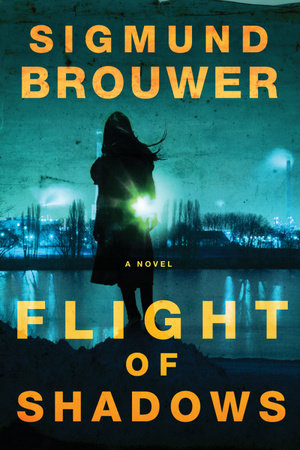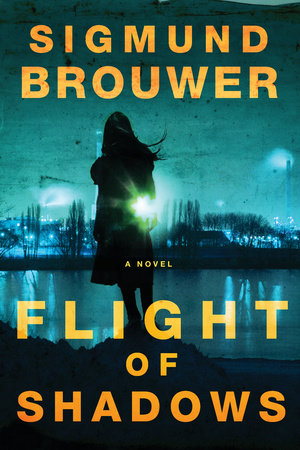Excerpt
Flight of Shadows
Prologue Outside, wind and rain and darkness. On the main floor, rattling of the big windows that took the brunt of the storm. But below, in the hidden rooms, where there was usually hushed silence, Jessica Charmaine approached a glass wall to a sound that she dreaded. Groaning.
Charmaine had learned that her hybrids on the other side of the glass had a wide range of sounds, and it wasn’t difficult to read emotions into those sounds. Sometimes, for example, she would enter and hear soft mewling. She would know in an instant that one had rolled away from the other. And that each would grope and roll until they were united again. She would help them back together and watch their faces contort in joy at the touch of the other. Other times, their sounds expressed curiosity. Fear. Puzzlement. Sorrow. Frustration. She was convinced that they were trying to speak.
She knew why they were incapable of it. Charmaine had two doctorates.The first was in genetic science, and the second, by necessity for this long-term experiment, was as an uncertified surgeon. She prided herself on her medical skills and her specialized knowledge.
As required, using the equipment behind her in this large, partitioned room, she’d long ago mapped out the genomes for these creatures. She still spent hours and hours puzzling over their gene sequences; if she could unlock the mystery, no longer would this experiment need to remain hidden from the world. In her studies, she’d learned early by comparing the genetic mutations of the hybrids to
Homo sapiens, that the FOXP2 gene of the hybrids had been altered by three specific amino acid differences.
She could have written a fascinating paper on this, definitively answering a long-disputed theory on why humans could speak and chimpanzees could not.The paper—and the existence and characteristics of her hybrids—would establish her reputation as a world-class scientist at the top of her game.
The irony, of course, was that the same existence and characteristics demanded the secrecy that would doom her as a scientist to perpetual obscurity. Unless she cracked the mysteries behind the genetic code of the hybrids and their near miraculous powers.To say the payoff would be enormous gave no idea of what was at stake.Without doubt, it would be the physics equivalent of generating an antigravity device.
She’d been close once. Oh, so very close. Decades earlier, as a co-director in the Genesis Project. But as the experiments neared the brink of final discovery, a scientist named Jordan Brown had unleashed a near-perfect storm of destruction upon the project. Along with the total deletion of irreplaceable computer data and all backups, he’d triggered a laboratory explosion and an official loss of all the cataloged embryos. Even so, Charmaine might have had a chance of rebuilding her research, but funding for the crippled project had been swept away by much larger events: theWaterWars that forced government focus on survival, not experiments.
All would have been lost, except for three embryos not listed in the official report. Two of the three embryos belonged to these hybrids, serialized embryos she’d managed to rescue just before the explosion and over the years had secretly nurtured to maturity. For these two hybrids, she’d sacrificed her personal life in search of her holy grail, and her ambitions had slowly evolved.
Charmaine had accepted this evolution so completely that she took a different satisfaction from her long hours with the hybrids.When she first spoke to them, it had been merely experimental, trying to learn whether they had the required motor and mental skills for speech. Now it was different, reflective of her emotional commitment to them. Always the detached observer, Charmaine guessed that part of her bond to them was maternal, a subconscious reaction to her deliberate choice to put career—and this long-term experiment—ahead of anything else in her life. It could even be said that her affair
had been dictated by the hybrids. She was single and attractive, but with her need for secrecy, she had limited her suitors in a practical way to serve her quest. Except for Jordan Brown, who had been a fugitive since the lab explosion, the man she’d chosen for a prolonged affair was the one and only other person who had knowledge of the hybrids.
Because of her maternal bond, when entering the glass cage, she would often lean over them, utter soothing words, or help each find the other if they had separated.They were adolescents, still growing. She knew they loved her. This gave her joy. Not enough perhaps to make up for the irony that such an incredible scientific achievement had to be hidden so carefully until someday she learned their secret. But enough that she did not resent all the time they needed from her.Their world had become her world.
Tonight, the groaning told her that for the next many days and nights, there would be no joy.This sound from their partition was a unique tone for them, like unarticulated words of resigned anguish. It told her that one or the other was feeling pressure again from unrestrained muscular growth.
One of the many alterations in their genetic makeup had left the hybrids without the ability to produce myostatins—molecules that fit into receptors on the membranes of muscle cells and blocked growth. Even without their deformities, their skeletal structures were incapable of withstanding strain exerted when their muscle growth bloomed past a certain point.Without the operations to pare those muscles back, they would have died years earlier. She sighed.Yet once more, the looming collapse of their ribs would make
the next weeks sheer hell for the hybrids.
The partition was lit softly and well padded on the floor, separated from the remainder of this laboratory by the glass wall that allowed her to observe them at any and all hours. Charmaine’s side was equipped so that she could perform surgery in one area and indulge in her pursuit of genetic knowledge in the other.
Their side was almost like a nursery for babies.The difference was the lack of simple toys.The hybrids were blind and had only grotesquely shortened legs and stumps for arms, born with stubs of fingers and toes at the end of their appendages.Their faces seemed to have smudged features, as if they constantly rubbed their faces against the glass.
She did not find their appearance hideous. At least not anymore.
As she touched a hand to the glass, their groaning stopped briefly. She didn’t know if they could hear her, or feel the movement of air through the circular holes at the top of the glass wall, or perhaps smell her skin. But she’d never been able to catch them unaware of her watching them. This awareness would be reflected by a stillness when she was nearby. Even when separated and mewling, each would pause in its search for the other, turning their deformed faces in her direction with the instinctive searching of
visual cortexes that had never developed.
Charmaine sighed again as the groaning resumed, a sound that pierced her with sadness.
This cycle had hit both hybrids at the same time.
Charmaine hated it. One would have to suffer while the other received the operation that provided relief. There was no other way. They were too valuable to risk simultaneous operations; doing it separately meant if one died, the other would still be alive.
At her renewed sigh, despite their obvious pain, both hybrids wiggled their arms stumps in her direction.Waving, like small children. It didn’t surprise her anymore.Toomuch of their geneticmakeup belonged to
Homo sapiens.This, too, pierced her with sadness, that they had the instinct to love her.
Now, however, for the first time in years, to help her endure this sadness, she had a renewed strength and sense of purpose.
Much as Jordan Brown had tried to stop it, the Genesis Project was on the verge of total resurrection. All these years later, she had just learned of his single mistake—in the aftermath of the long-ago lab explosion, he had not destroyed the third embryo. Charmaine now knew that the last embryo, like her hybrids, had survived to maturity and, unlike the hybrids, carried the genetic material that could unlock everything.
This embryo no longer had a serialized catalog number. But a name, given by Jordan Brown.
Caitlyn.






